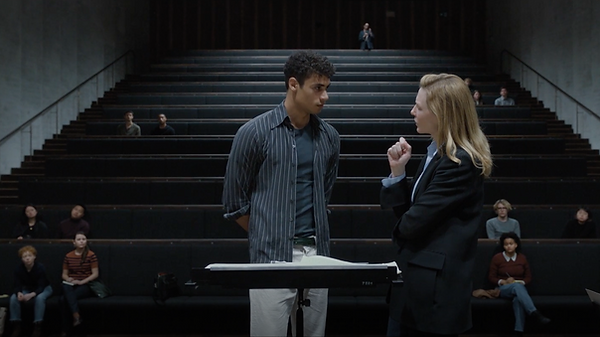With the promotion and advancement of human rights equality and diversity, we can now see more and more people acknowledging their identities. However, as identity is increasingly valued, what does identity mean in this era? What are true inclusion and equality?
Soon after the winners of the 95th Academy Awards were revealed, people around me have been discussing the reflection and impact of political correctness on the film industry today; perhaps it is because of the huge success that Everything Everywhere All at Once achieved in this year’s Oscar or such trend can also be observed through the diverse themes of the nominated films. For me, Tar is one of the films nominated this year that deeply explores identity and entitlement.

(Tár conducting the orchestra, source from https://www.imdb.com/title/tt14444726/)
The film tells the story of Lydia Tár, not only the first female conductor of a major German orchestra but also considered one of the greatest living composer-conductors around the world, and depicts how Tár got canceled by the industry for unethical abuse of power. Since I didn't read the introduction to this film before watching it, what I only knew was the film is about a female conductor, so I expected it to be a feminist movie or a film that exposes the challenges women face in the workplace. However, after watching it, the huge contrast in expectations made me fall into deep thought.
The first thing that makes me ponder the most is the meaning of nowadays people's identities. In the film, Tár is a female, lesbian conductor, which makes her the most iconic woman in the field and also makes her success all the more meaningful. Nevertheless, in a class she taught at Julliard, She defied one student’s opinion about Johann Sebastian Bach’s reproductive exploitation. Even after the student claimed that being a BIPOC, pangender person, he does not accept Bach's misogynistic life, Tár insisted that one's moral character has nothing to do with artistic creation. After the students stormed out, she said “Don't be so eager to be offended. The narcissism of small differences leads to the most boring kind of conformity.” What surprised me is that compared to her students, Tár never felt special about her identity, even with such achievement. She recognizes her own identity, but at the same time, it does not affect her judgment of the value of art.

(Tár asking the student why he came to Julliard, source from https://www.nytimes.com/2023/01/02/movies/lydia-tar-juilliard-conducting-scene.html)
In this regard, I seem to understand the point of view of the student but at the same time agree with what Tár suggested. From my perspective, I would prefer to regard the recognition and inclusion of identity as an essential part of social justice, yet I don't think diverse identity should be a type of privilege that despises others, such as people with other identities and achievements made ethically. However, in today's society, we can notice that identity has been attached to more meaning other than advocating social justice and equal rights. For instance, just recently, Rachel Zegler got accused of discriminating against an Asian influencer. In response, she posted an Instagram video in which she flipped a middle finger to the camera and wrote “respect women today and every day,” which caused heated controversy on Chinese social media. While I am very disgusted with the racist and insulting remarks made by some Chinese netizens under Rachel's social media, it is obviously disrespectful to take advantage of one’s identity to cover up her discrimination against another group. Isn’t it most ideal when people with all different identities are equally respected and no group is marginalized or treated specially?

(Tár comforting her wife Sharon when she is unwell, source from https://www.hollywoodreporter.com/movies/movie-features/nina-hoss-interview-tar-character-psyche-1235272034/)
The film also reveals today’s cancel culture as Tár got canceled because of her abuse of power. Just like Bach, her achievements were also directly denied/forgotten because of what she did. People can also find countless similar examples in the reality. I am certainly not into Bach's or Tár’s acts, but can a person's achievements be negated because of his behavior? Can we truly separate individuals’ talents from their character? It's hard to say, but at least one person's achievements must not make up for his/her/their mistakes and harm caused to others, I guess.
Another point that complicated me is seeing Tár, after achieving such success, end up abusing her power to violate others. Characters obsessed with power abuse and oppression are stereotypically male in my superficial impression. After watching the film, I feel that maybe character and gender have never been related, and power is the root cause of many issues. In the end, it's social relationships, power structures, legal boundaries, and gender politics -- things that Tár didn’t care about -- that end up trapping her and bringing her down from the top. Perhaps for her, her artistic talent is an absolute authority, and meanwhile, it is also a kind of excuse or self-persuasion for her misbehavior.

(Tár breaking into the performance hall after being canceled, source from https://filmfreedonia.com/2022/11/22/tar-2022/)
There is much more in the film that is worth exploring. Maybe just like there is no absolute good or bad, we can never define a person from one angle, whether it is his/her/their identity, background, character, or achievement. Ultimately we still have to learn to think critically and embrace the diversity of thought and people.


